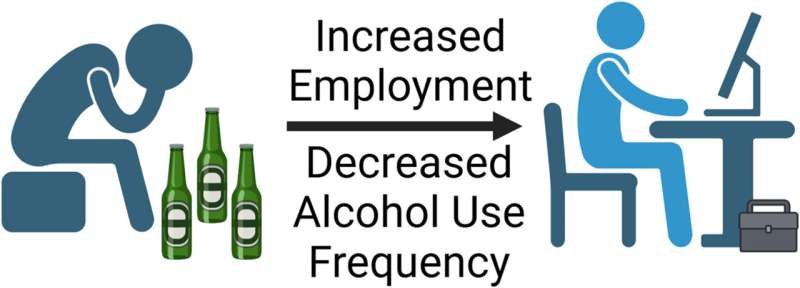
Having a job may give people a better chance at recovery following treatment for alcohol use disorder. Nationwide data from people who received outpatient treatment for alcohol use disorder found that people with full-time jobs drank less frequently at the end of treatment. And those whose employment status increased during treatment, for example from unemployed to employed full-time, had greater reductions in alcohol use frequency than those whose employment status did not change.
These findings, published in Alcohol: Clinical and Experimental Research, suggest that employment may be an important component of recovery success and support the case for programs and policies that reduce barriers to employment, such as vocational skills training and fair chance hiring practices, for people with a history of alcohol use disorder.
Researchers analyzed five years of discharge records from over two hundred thousand people who had been in outpatient treatment for alcohol use disorder for the first time. Of all study participants, 40% reduced how frequently they drank by the end of treatment. About half of those employed full-time, either at admission or discharge, drank less often by the end of treatment.
The biggest effects were seen in people who were not employed or worked part-time at admission and shifted to full-time work by the time they were discharged—70% of these individuals reduced how often they drank. By contrast, people who were unemployed at both admission and discharge had the worst outcomes with regard to drinking frequency, with only one-quarter drinking less frequently.
Employment may provide essential benefits, such as structure, feelings of self-worth, financial stability, and social networks, which can contribute to successful recovery from addiction, the researchers said. Prior studies have found employment to be associated with improved overall health and quality of life for people in general and those with psychiatric diagnoses, while lack of employment and less education have been associated with an increased risk of continuing alcohol use after treatment.
People with a history of alcohol use disorder have particular challenges when trying to find work. They may face stigma, and are more likely to have been laid off or fired, have had long periods of unemployment due to their drinking, or have criminal records. The study authors recommend that treatment for alcohol use disorder incorporate job-seeking and coping skills.
Prior studies have found that when treatment includes job-seeking support, the individual has an improved quality of life, fewer work-related problems, and is more likely to complete treatment and stay sober longer. The authors recommend employer policies to reduce stigma and barriers to employment for people with alcohol use disorder, citing “Ban the Box” and “Fair Chance Hiring,” which delay or de-emphasize background checks in the application process.
The study used a national dataset from the U.S. Substance Abuse and Mental Health Services Administration. Certain factors that could affect job status were not included in the analysis, such as other medical or neuro-cognitive conditions, access to reliable housing or transportation, or specific legal charges. The findings in this study are not causal associations and may not be generalizable to people who are not seeking treatment for alcohol use disorder.
More information:
Nicholas L. Bormann et al, Positive changes in employment status are associated with reduced alcohol use frequency at discharge from outpatient specialty treatment, Alcohol, Clinical and Experimental Research (2025). DOI: 10.1111/acer.70044
Research Society on Alcoholism
Citation:
Employment may support recovery from problem drinking (2025, May 30)
retrieved 30 May 2025
from https://medicalxpress.com/news/2025-05-employment-recovery-problem.html
This document is subject to copyright. Apart from any fair dealing for the purpose of private study or research, no
part may be reproduced without the written permission. The content is provided for information purposes only.

